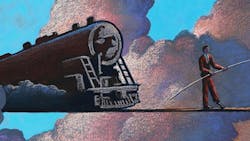Looming Talent Shortage May Hamper Expansion of Risk Management Capabilities
Risk management, a high-profile career in today’s increasingly complex and global organizations, is more frequently recognized as a critical corporate capability than it was in years past. In fact, 98% of 446 executives participating in Accenture’s 2013 Global Risk Management Study said risk management is more important today than it was just two years ago.
The backdrop for the heightened interest in risk management, based on the survey, finds 62% of respondents facing greater legal risks; 52% up against business risks related to changing volumes, margins or demand; and 49% seeking to comply with increased regulatory requirements.
For many corporations, the risk management workload is tapping out their teams. And, as recent Accenture research shows, finding the right risk management talent is becoming a major obstacle for many when they want to strengthen their risk management bench. More than half (54%) of the executives surveyed reported a shortage of candidates with the right skills, and half said that weak recruiting strategies and insufficient training programs compounded their talent search conundrum.
The talent shortages in risk can crop up everywhere, from business and data analytics to risk technology to regulatory change program management. Major regulatory initiatives such as Dodd-Frank and Basel III—along with new risks resulting from natural disasters, supply chain disruption and political upheaval around the globe—call for new talent to develop analytical models and build risk analytics into new management models.
For many businesses, these talent shortcomings can hinder their risk mitigation and the execution of business objectives where risks are inherent.
Banks and insurance companies are not alone in feeling the talent squeeze. Fierce competition for strong risk expertise today is evident across sectors. While this may represent an opportunity for the select soon-to-be college graduates with much-needed skills, it presents a possible problem for organizations seeking to take advantage of new technologies to further ramp up their risk management capabilities in the more immediate term. Nothing happens without the rightly skilled people.
If the risk management function is to effectively fulfill its role, organizations should consider attracting, developing and retaining talent with specific skills who also can interact effectively with the broader business. A comprehensive strategy for identifying and developing sustainable risk management talent—something many companies may lack—is now a focus for many leading organizations.
Risk management is after all a “people game,” and one that needs a team with strong business acumen. It’s the people that represent the opportunity for an organization to bravely execute the growth and innovation agenda with the knowledge that the risk mitigations are in place—and the organization is prepared—for the times when unplanned events occur.
Steve Culp, managing director of the Accenture Risk Management consulting group, works with clients to define their strategy and to execute change programs across risk management and the broader finance function.
